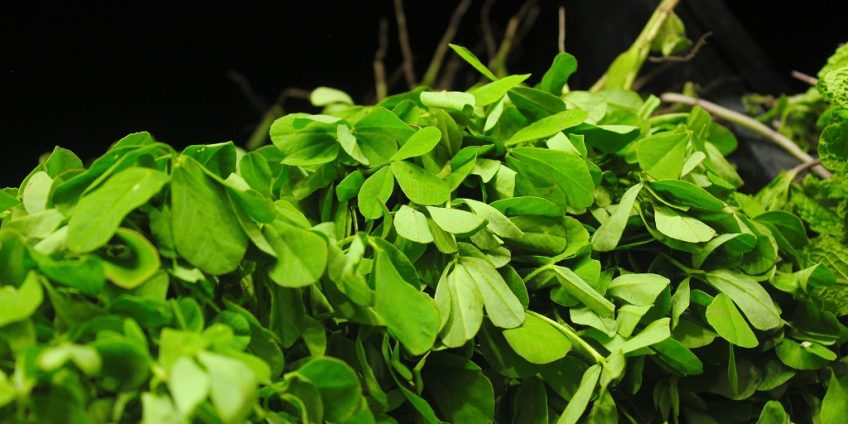Scroll to Recipes with Fenugreek Leaves / कसूरी मेथी as ingredient
Fenugreek leaves are an annual plant in the family Fabaceae. Its seeds and leaves are common ingredients in the kitchen of Indian households. Even if it mainly has culinary use, traditionally, it has been used as medicine. Fenugreek is believed to have been brought into cultivation in the Near East.
Fenugreek is native to South Asia and Southeastern Europe. But it is now also cultivated elsewhere, including North and East Africa, China, Greece, and Ukraine. These leaves have a milder flavor, tasting similar to a blend of fennel and celery.
Fenugreek is used as leaves and seeds. Fenugreek leaves are called methi. However, the dry fenugreek leaves are commonly known as Kasuri methi, a more commonly used ingredient in India than fenugreek leaves or seeds.
Commonly Known as
| Language | Name | Written as |
|---|---|---|
| Arabic | awraq alhalba | أوراق الحلبة |
| Bengali | Mēthi pātā | মেথি পাতা |
| Gujarati | Mēthīnā pāna | મેથીના પાન |
| Hindi | kasooree methee | कसूरी मेथी |
| Kannada | Mentya elegaḷu | ಮೆಂತ್ಯ ಎಲೆಗಳು |
| Malayalam | uluva ilakaḷ | ഉലുവ ഇലകൾ |
| Marathi | Mēthīcī pānē | मेथीची पाने |
| Punjabi | Mēthī dē patē | ਮੇਥੀ ਦੇ ਪੱਤੇ |
| Tamil | Ventayam ilaikaḷ | வெந்தயம் இலைகள் |
| Telugu | Menti ākulu | మెంతి ఆకులు |
| Urdu | Mēthi pātā | میتھی کے پتے |
Nutritional Profile of Fenugreek Leaves
Nutritional profile per 100 gms
- Calories: 180
- Protein: 4.82g
- Carbohydrate: 7.14g
- Fiber: 3.6g
- Fat: 750mg
- Sodium: 13mg
- Potassium: 626mg
Source: USDA & Google
Benefits of Fenugreek Leaves
Helps Reducing Cholesterol
Fenugreek cuts down cholesterol levels, triglycerides, and LDL (bad cholesterol). Fenugreek leaves also have a significant effect on lipid levels in our system. Thus it is excellent at reducing cholesterol in our body.
Help In Curing Diabetes
Fenugreek reduces the levels of cholesterol levels, triglycerides, and LDL. As a result, it helps in curing diabetes by fighting its symptoms. It also restrains glucose metabolism and lowers blood sugar levels. All these help curing diabetes in our bodies.
Reducing Heart Problems
Fenugreek has antioxidant properties present in them. These antioxidants help eradicate free radicals and protect the heart and body from any chronic disease or damage. Thus it ensures the health of our hearts.
Reduces Mark And Blemishes
Mix a few drops of water in fenugreek seed powder and blend till it becomes smooth and then apply the paste on the face and leave it for some time. It is as simple as that to use fenugreek leaves for reducing blemishes and marks.
Side Effects
If consumed in large quantities, it can have allergic reactions similar to that of peanuts. The most common problem with fenugreek is experiencing nausea. It might also have allergic reactions on the skin too. Pregnant women should avoid eating fenugreek leaves as it may induce labor.
Frequently Asked Questions
Is fenugreek terrible for health?
Fenugreek leaves and seeds are not harmful in general. However, there are some possible side effects of it. Women who are suffering from asthma should avoid fenugreek too much, even in powder and capsule form. It interacts with warfarin (blood thinner) and causes bleeding.
Is fenugreek safe?
Yes, fenugreek is safe. It won’t be harmful if taken in prescribed amounts on a daily basis. However, due to the bitter taste, people do not prefer having it in large quantities anyway.
Does fenugreek help with hair growth?
Fenugreek seeds have been used to treat hair loss and dandruff. However, there is a lack of research to support the same, and so one can’t say for sure if it helps with hair growth.

